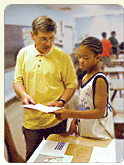



School Self-Assessment (SSA) is a program of professional development that supports schools in improving teaching and learning through ongoing reflection and peer review. A school undertaking SSA involves its whole staff in a process of goal-setting regarding student learning, and sets in motion a continuous cycle of internal self-review and external peer review that moves the school closer to its goals.
School Self-Assessment was developed by the Academy for Educational Development (AED), an independent, nonprofit organization based in Washington D.C and New York, with over 40 years of experience in the field of education. AED began the SSA project in Michigan in 1996 as part of Middle Start, a middle-grades educational reform initiative, with funding from the W.K. Kellogg Foundation.
Prior to its launch, Alexandra Weinbaum, SSA’s project director, investigated several self-assessment approaches in use nationwide.
This search led to the British school inspection approach, documented by Thomas A. Wilson (1996) in Reaching for a Better Standard: English School Inspection and the Dilemma of Accountability for American Public Schools.
This approach was adapted by the New York State Department of Education and implemented statewide as a voluntary program of peer reviews of schools using the state’s compact for learning as well as a school’s own goals as a framework for review. The New York adaptation of the British approach is described by Jacqueline Ancess (1996) in Outside/Inside, Inside/Outside: Developing and Implementing the School Quality Review.

